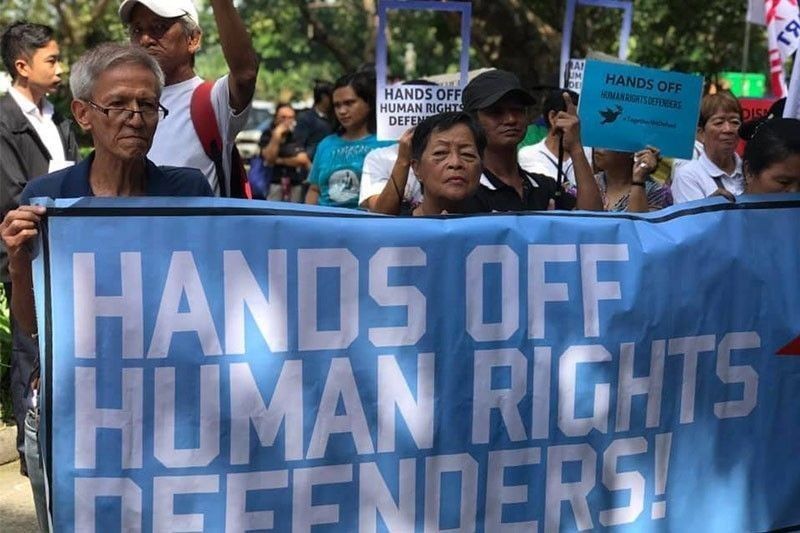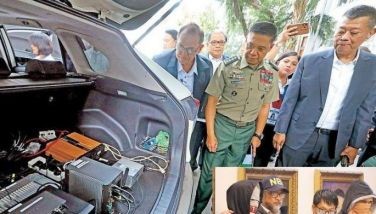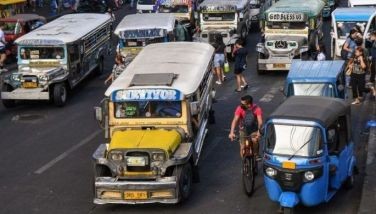Task force: Bill to protect human rights defenders unnecessary, contrary to law

BAGUIO CITY, Philippines — The Human Rights Defenders bill that the Makabayan bloc is seeking passage of is unneccesary, members of the government's anti-communist task force said.
Spokespersons for the National Task Force to End Local Armed Conflict also said the bill would be unconstitutional and would aid organizations that the government considers terrorists.
Undersecretary Severo Catura said the proposed legislation "seeks to institutionalize in the government, groups that are known fronts of the [Communist Party of the Philippines-New People's Army-National Democratic Front]" by making members of rights group Karapatan and lawyers' group National Union of People's Lawyers "mandatory members of the so-called 'Human Rights Defenders Protection Committee' that will be created once the law is enacted."
The government has taken the position that Karapatan, NUPL and other human rights and activist groups are fronts for communist rebels. The practice of conflating support for or membership in these groups with being involved in the communist insurgency is among the concerns raised in oral arguments at the Supreme Court against the Anti-Terrorism Act.
RELATED: 'Truth tagging' rhetoric reaches SC as anti-terror law debate resumes
Human Rights Defenders Protection Committee
The text of House Bill No. 240 — the bill filed by members of the Makabayan bloc — only proposes the creation of the committee, members of which would be appointed by the Commission on Human Rights.
Karapatan and NUPL are among the groups who will be allowed to nominate members to the committee. Other groups that can nominate members to the committee are the the National Council of Churches of the Philippines, Philippine Alliance of Human Rights Advocates, Free Legal Assistance Group and the National Secretariat for Social Action, Justice and Peace of the Catholic Bishops Conference of the Philippines.
House Bill No. 15 filed by Rep. Edcel Lagman (Albay) and House Bill No. 161 filed by Rep. Jose Christopher Belmonte (Quezon City) propose the creation of similar committees composed of nominees from rights groups, including Karapatan and NUPL.
A counterpart bill at the Senate that lists Sens. Leila De Lima and Risa Hontiveros as authors carries a similar provision.
The committee will chaired by a CHR commissioner and will have, among its tasks, the protection of human rights defenders from intimidation and reprisals, the facilitation of inter-agency and inter-department coordination against intimidation and reprisals, and the conduct of investigations into them.
RELATED: Labeling dissent as rebellion 'institutionalized, normalized' in Philippines — UN report
Government: 'Human Rights Defender' is not a job title
HB 240 defines a human rights defender as one who "acts or seeks to act to protect, promote or strive for the protection and realization of human rights and fundemental freedoms" and asserts that "any bonafide member of a human rights organization shall be considered to be a human rights defender."
But Catura argued "human rights defenders is not a job title", claiming also that "what the UN has directly stated is that the government, police and military are the defenders of human rights."
The government and its security forces are considered duty bearers, or those who have the duty to "protect, promote and implement all human rights."
Lawyer Marlon Bosantog, also of the NTF-ELCAC, claimed that the bill would protect rebels like NPA leader Jorge Madlos, who was killed in a military operation in Bukidnon in October.
"For [Indigenous People]s, he was their butcher. But under the bill he can be defended," Bosantog claimed.
Section 24 of HB 240 recognizes that rights defenders are "subject only to limitations that are presecribed by law, in accordance with international human rights obligations and standards" and those that are needed to ensure others' rights and "the reasonable requirements of public order and general welfare in a democratic society."
Lawyer Rhowee Buergo, also of the NTF-ELCAC, said the bill "contradicts existing laws" like the Anti-Money Laundering Act of 2001, the Anti-Terrorism Act of 2020, and the Data Privacy Act of 2012.
Brig. Gen. Joel Alejandro Nacnac, director of the Armed Forces of the Philippines - Center for Law of Armed Conflict (AFP-CLOAC), stressed the bill "is not necessary" because the country has enough laws and the Constitution has enough measures and protections in place against human rights violations.
"Congress should look into the backgrounds of the proponents of the one-sided bill," he also said.
Mary Lawlor, UN special rapporteur on the situation of human rights defenders, in March called on Philippine legislators to make passage of a bill to protect human rights defenders a priority.
"Enacting legislation at the national level is an important means by which States can recognise the work of human rights defenders and create robust mechanisms for their protection, and I urge all members of the Congress to get behind this praiseworthy initiative," she said.
"In my recent report to the Human Rights Council, I highlighted the extremely serious risks faced by those peacefully defending human rights around the world, including in the Philippines, and documented the legislative efforts already made by some States to protect them," she also said.
"By prioritizing legislation to protect human rights defenders, the Philippines would join that group and send a clear message about their willingness to uphold their human rights obligations."
RELATED: CHR hopes talk at human rights summit will be felt on the ground
— Jonathan de Santos with a report by The STAR/Artemio Dumlao
- Latest
- Trending


































